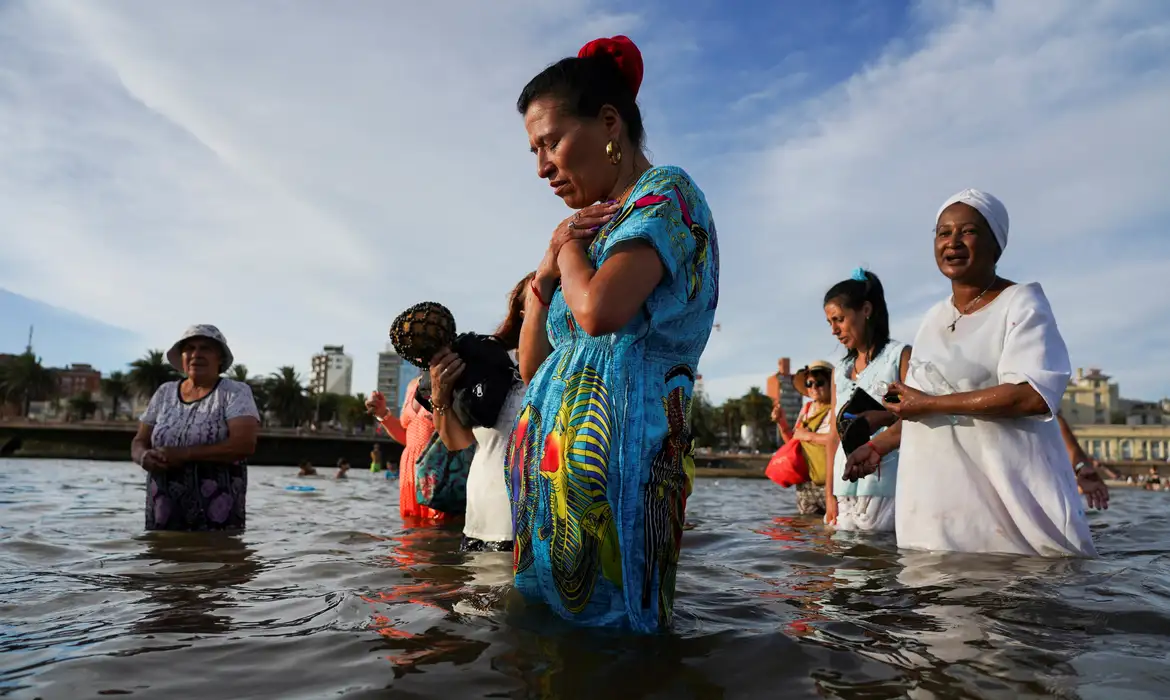Number of followers of African-based religions grows in South America
In Uruguay, the amount of followers doubled in 12 years
Lucinda Elliott and Candelaria Grimberg - Reuters
Published on February 03, 2024 - 19:06
Montevideo
© REUTERS/Mariana Greif
Thousands of devotees from different African religions gathered on the beach in the Uruguayan capital on February 2 as part of an annual offering to the goddess of fertility and prosperity, Yemanja.
“People looked to the sea to return to freedom, to their native Africa”, said Susana Andrade, known as Mãe Susana de Oxum, president of the Afro-Umbandista Federation of Uruguay. ”It was a way to escape the horror of slavery and humanize nature”.
Followers of African religions are on the rise in South America, new data shows, and that may be a reflection of how the region's African heritage is gaining more voice beyond Brazil, where such traditions are widely recognized.
Research on religious beliefs in Argentina and Uruguay points to a growing number of people who identify with African-inspired beliefs.
Sasha Curti, who grew up in a predominantly Catholic Uruguayan family, went to Ramirez Beach in Montevideo with members of her Umbanda temple to give thanks to Yemanja.
“We’re no longer hidden”, said Curti, who works as a hairstylist specializing in Afro-textured hair, a change she attributed to greater education about her history. “But there’s still a lot of discrimination and work to be done”.
Along Ramirez Beach, groups dig shallow altars in the sand, placing candles, watermelons and corn as offerings to Yemanja, often called the queen of the sea, to ask for good luck.
Umbanda, like Candomblé, was first popularized in Brazil and has its roots in the transatlantic slave trade. According to scholars, adherents combined native African beliefs with elements of Catholicism and local indigenous American traditions, creating syncretic religions that went undetected by Europeans.
More than 2% of Uruguay's population identifies as followers of African-based religions such as Umbanda.
“We have fought for our right”
A survey carried out by Uruguayan sociologist Victoria Sotelo, from the University of the Republic, found that the number of people who practice a religion of African origin in the country more than doubled in 12 years, reaching 2.1% of the population in 2020, compared to 0.7% in 2008.
In Argentina, adherents are also on the rise, though they are starting from a lower base. The nonprofit pollster Latinobarómetro found that 0.3% of Argentina’s population in 2023 said they had practiced an Afro-American religion for at least six years, up from 0.1% in 2008.
A possible contributing factor is the growing awareness of Afro-descendant cultural identity that has long been silenced in Argentina and Uruguay.
In a sign of changing perceptions of racial identity, Argentina formally included a question for people of African descent in its 2022 national census, in what was seen as a victory by activists.
“There is a very large (black) population in Argentina that, due to the historical process the nation has gone through, is not acknowledged as people of African descent”, said Greta Preña, former director of Argentina’s National Institute Against Discrimination, Xenophobia and Racism (INADI).
There is a “fundamental myth“ of a strictly European Argentina, she said, that has helped erase black culture from the nation's consciousness.
Paraguay, on the other hand, passed an anti-discrimination law in 2022 to protect people of African descent.
This year, Uruguay's Hijos de la Diáspora collective, a group dedicated to the recognition of Afro-descendant culture, expects that when the 2023 results are published, the percentage of people who identify as Afro-descendant will be well above the 8% recorded in the 2008 census.
Devotees of these religions are not exclusively of African descent, but greater adherence to traditional spiritual practices is helping to raise racial consciousness more broadly.
While African-based religions have gained ground, with their relatively liberal social customs and focus on community, more work needs to be done to combat stigmatization, Mãe Andrade warned.
Oral histories and traditions associated with African religions have been misinterpreted or demonized as “witchcraft“, she explained.
“We have fought for our right to practice religion, which in theory protects us from discrimination“, she said. “But in reality, we don't even have tax-exempt houses of worship like churches, and we are not treated equally“.
Number of followers of African-based religions grows in South America
